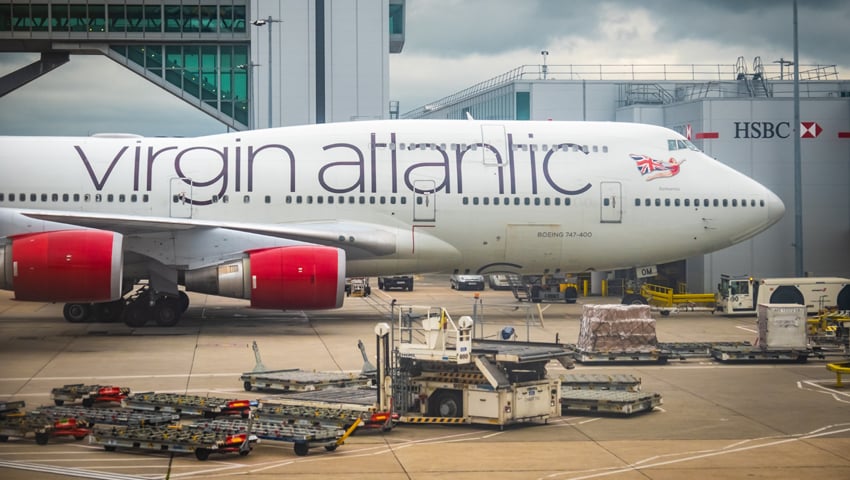VIRGIN Atlantic says that it has flown the world’s first “100% Sustainable Aviation Fuel (SAF) flight”, from London Heathrow to New York JFK. But the news has been met with concern by land use campaigners, who say that the flight’s success raises further questions about the impact of biofuels on food production.
According to Virgin Atlantic, the flight marks the culmination of a year of radical collaboration, to demonstrate the capability of SAF as a safe drop-in replacement for fossil derived jet fuel, compatible with today’s engines, airframes and fuel infrastructure.
The SAF used on Flight100 is a unique dual blend: 88% HEFA (Hydroprocessed Esters and Fatty Acids) supplied by AirBP and 12% SAK (Synthetic Aromatic Kerosene) supplied by Virent, a subsidiary of Marathon Petroleum Corporation. The HEFA is made from used cooking oil and waste animal fats, while the SAK is made from plant sugars, with the remainder of plant proteins, oil and fibres continuing into the food chain. SAK is needed in 100% SAF blends to give the fuel the required aromatics for engine function. To achieve Net Zero 2050, the innovation and investment needed across all available feedstocks and technologies must be harnessed to maximise SAF volumes as well as continuing the research and development needed to bring new zero emission aircraft to market.
However, the milestone raises questions over the definition of “sustainability” and on the impacts of biofuels on food systems.
Sue Pritchard, chief executive of the Food, Farming and Countryside Commission, said, “The land use implications of this strategy are immense. We already know that biofuel crops are contentious and in competition for land, when – arguably – we should be prioritising sustainable food production, carbon sequestration and nature recovery. Virgin may be solving one problem for themselves, but the potential consequences for society are significant.”
Jayne Buxton, author of The Great Plant-Based Con, said, “Oh the irony: cows are a leading driver of climate change if their tallow and meat are consumed as food, but labelled as a ‘sustainable’ fuel source if the tallow is consumed by the aviation industry.
“While the idea sounds promising, important questions remain, such as cost and adequacy of supply. It’s also critical that, if cattle are to become a source of fuel, any emissions burden be accurately allocated to different sectors. Currently that isn’t the case, with emissions allocated to food but not co-products.”
Virgin Atlantic says that SAF has a significant role to play in the decarbonisation of long haul aviation, and pathway to Net Zero 2050. The fuel delivers CO2 lifecycle emissions savings of up to 70%, whilst performing like the traditional jet fuel it replaces.
While other technologies such as electric and hydrogen remain decades away, SAF can be used now. Today, SAF represents less than 0.1% of global jet fuel volumes and fuel standards allow for just a 50% SAF blend in commercial jet engines.
A Virgin Atlantic spokesperson said, “Flight100 proves that the challenge of scaling up production is one of policy and investment, and that industry and government must move quickly to create a thriving UK SAF industry.”
As well as proving the capabilities of SAF, Flight100 will help the company assess how its use affects the flight’s non-carbon emissions with the support of consortium partners ICF, Rocky Mountain Institute (RMI), Imperial College London and University of Sheffield. The research will improve scientific understanding of the effects of SAF on contrails and particulates and help to implement contrail forecasts in the flight planning process. Data and research will be shared with industry, and Virgin Atlantic will continue its involvement with contrail work through RMI’s Climate Impact Task Force, which is part-funded by Virgin Unite.
Shai Weiss, Chief Executive of Virgin Atlantic said: “Flight100 proves that Sustainable Aviation Fuel can be used as a safe, drop-in replacement for fossil-derived jet fuel and it’s the only viable solution for decarbonising long haul aviation. It’s taken radical collaboration to get here and we’re proud to have reached this important milestone, but we need to push further.
“There’s simply not enough SAF and it’s clear that in order to reach production at scale, we need to see significantly more investment. This will only happen when regulatory certainty and price support mechanisms, backed by Government, are in place. Flight100 proves that if you make it, we’ll fly it.”
